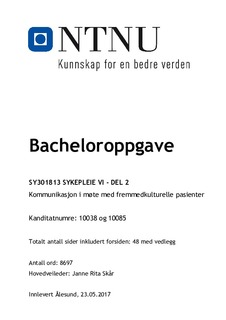Kommunikasjon i møte med fremmedkulturelle pasienter
Bachelor thesis
Permanent lenke
http://hdl.handle.net/11250/2461896Utgivelsesdato
2017Metadata
Vis full innførselSamlinger
Sammendrag
Bakgrunn: Det norske samfunnet er i stadig utvikling og preges i dag av et økende kulturelt mangfold. Dette påvirker helsetjenesten og sykepleiernes arbeidshverdag hvor man oftere kan møte pasienter med fremmedkulturell bakgrunn. God kommunikasjon er et grunnleggende element for å kunne utøve en optimal sykepleie. Men i mange tilfeller kan kommunikasjon være en utfordring i samhandlingen med denne brukergruppen. I følge Pasient- og brukerrettighetsloven §3-5 har alle pasienter rett på informasjon tilpasset deres behov og forutsetninger (Helse og omsorgsdepartementet 1999/2016). For å sikre at alle pasienter får likeverdige helsetjenester og rett til medvirkning til sin helsesituasjon, er det derfor nødvendig at sykepleiere utøver faglig forsvarlig helsehjelp, også i møte med pasienter med fremmedkulturell bakgrunn.
Hensikt: Hensikten med denne oppgaven er å se nærmere på sykepleiers erfaringer med kommunikasjon i møte med pasienter med fremmedkulturell bakgrunn i helsetjenesten.
Metode: Oppgaven baserer seg på en systematisk litteraturstudie, hvorav åtte refereebedømte forskningsartikler fra år 2010-2017 har blitt analysert. De inkluderte forskningsartiklene er hentet fra databasene Cinahl Complete, PubMed og SveMed.
Resultat: Fire hovedfunn ble avdekket: bruk av tolk, kommunikasjonsstrategier, kulturell kompetanse og faktorer som påvirker kommunikasjonen.
Konklusjon: Den viktigste strategien for å sikre tilstrekkelig kommunikasjon i møte med fremmedkulturelle pasienter er i følge vår studie bruk av tolk. Det er opp til hver enkelt sykepleier å tilpasse bruken av tolk til pasientens beste, dette være seg en tolk som er fysisk til stede, telefontolk, flerspråklige ansatte eller om ytterst nødvendig voksne familiær/pårørende oversettere. Ulike kommunikasjonsstrategier kan utgjøre en vesentlig forskjell ved å forsterke sykepleiers samhandling med pasienten. Kulturell kompetanse er også en avgjørende faktor som påvirker sykepleiers holdninger i sin profesjonsutøvelse. Faktorer som påvirker kommunikasjonen er språkbarrierer og sykepleier-pasient relasjonen. Background: The Norwegian society is constantly evolving and is today characterized by an increasing cultural diversity. This affects the health care service and nurses' working day where they can meet patients with a foreign-cultural background more frequently. Good communication is an essential element for executing an optimal nursing care. But in many cases can communication be a challenge in the interaction with this user group.
According to Pasient- og brukerrettighetsloven (Patient and Users' Rights Act) §3-5 are all patients entitled to information adapted to their needs and preconditions (Helse og omsorgsdepartementet 1999/2016). In order to ensure that all patients receive equal healthcare services and the right to participate in their health situation, it is therefore necessary that nurses carry out a professional health care, also in the interaction with patients with a foreign-cultural background.
Purpose: The purpose of this study is to look into nurses` experiences with communication in interaction with foreign-cultural patients in the health care service.
Method: We conducted a systematic literature study, and included eight research articles from the year 2010-2017. Cinahl Complete, PubMed and SveMed are the databases where all the research articles were found.
Results: Four main findings were revealed: use of interpreters, communication strategies, cultural competence and factors affecting communication.
Conclusion: The most important strategy to ensure adequate communication in interaction with foreign-cultural patients is the use of interpreter. It is up to each nurse to facilitate the use of an interpreter in the best interest for the patient: whether its an interpreter who is physically present, interpreter by telephone, multilingual staff or if highly necessary adult family/relatives translators. Different communication strategies can make a significant difference by strengthening the nurses interaction with the patient. Cultural competence is also a decisive and essential factor that affects nurses` attitude in their professional practice. Factors that affect communication are language barriers and the nurse-patient relationship.

